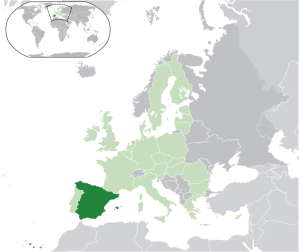Previous Articles:
What next for Spain’s ‘Indignados’? – Brendan Ryan
Career Women in Spain – Tough Decisions – Brendan Ryan
Animal Welfare in Spain – Some good news – Brendan Ryan
Spain, officially the Kingdom of Spain (Spanish: Reino de España), is a country and member state of the European Union located in southwestern Europe on the Iberian Peninsula. Its mainland is bordered to the south and east by the Mediterranean Sea except for a small land boundary with the British Overseas Territory of Gibraltar; to the north by France, Andorra, and the Bay of Biscay; and to the northwest and west by the Atlantic Ocean and Portugal.
Spanish territory also includes the Balearic Islands in the Mediterranean, the Canary Islands in the Atlantic Ocean off the African coast, and two autonomous cities in North Africa, Ceuta and Melilla, that border Morocco. Furthermore, the town of Llívia is a Spanish exclave situated inside French territory. With an area of 504,030 square kilometres (194,610 sq mi), it is the second largest country in Western Europe and the European Union after France.
Because of its location, the territory of Spain was subject to many external influences since prehistoric times and through to its dawn as a country. Spain emerged as a unified country in the 15th century, following the marriage of the Catholic Monarchs and the completion of the reconquest, or Reconquista, of the Iberian peninsula in 1492. Conversely, it has been an important source of influence to other regions, chiefly during the Modern Era, when it became a global empire that has left a legacy of over 500 million Spanish speakers today, making it the world’s second most spoken first language.

